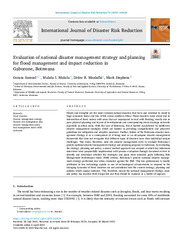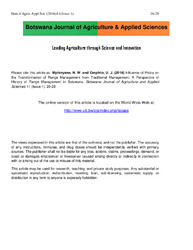Evaluation of national disaster management strategy and planning for flood management and impact reduction in Gaborone, Botswana
Date
2022-05Author
Samuel, Gorata
Mulalu, Mulalu I.
Moalafhi, Ditiro B.
Stephens, Mark
Metadata
Show full item recordAbstract
Floods and droughts are the most common natural disasters that have and continue to result in huge economic losses and loss of life across southern Africa. Flood disasters come about due to intersection of flood waters with areas that are unprepared to deal with flooding, mostly due to poor physical planning and layout of developments and corresponding storm drainage networks especially in urban areas. With the case of Botswana, this is further exacerbated by ineffective disaster management strategies which are limited in providing comprehensive and proactive guidelines for mitigation and adaptive measures. Further, failure of the Botswana disaster management strategy is as a consequence of it being used as an all-purpose disaster management framework that does not recognize that different types of disasters have their individual unique challenges. This study, therefore, used the disaster management cycle to evaluate Botswana's generic national disaster management strategy and planning program in Gaborone. In evaluating the strategy, planning and policy, a mixed method approach was adopted at which key informant interviews were purposefully implemented with process evaluation through document review to identify and determine whether the strategies and plans meet intended goals following Risk Management Performance Index (RMI) criteria. Botswana's generic national disaster management strategy performed low when evaluated against the RMI. This low performance is mostly attributed to low technology uptake as use of technological advancements to respond to the changing dynamics of flood disasters are not assimilated into the current strategy, planning and policies which appear outdated. This, therefore, means the national management strategy, plan, and policy has reached their design life and thus should be replaced as a matter of urgency.
Collections
- Research articles [88]
Related items
Showing items related by title, author, creator and subject.
-
Influence of Policy on the Transformation of Range Management from Traditional Management: A Perspective of History of Range Management in Botswana
Mphinyane, N. W.; Omphile, U. J. (Botswana University of Agriculture and Natural resources, 2016)The government of Botswana, through an Act of parliament enacted the Tribal Land Act of 1968 which gave Land Boards the power to allocate land which previously was allocated by chiefs. Most farmers only applied for water ... -
Spatial variability of measured soil properties across site‐specific management zones
Mzuku, M.; Khosla, R.; Reich, R.; Inman, D.; Smith, F.; MacDonald, L. (Soil Science Society of America Journal, 2005-09)The spatial variation of productivity across farm fields can be classified by delineating site‐specific management zones. Since productivity is influenced by soil characteristics, the spatial pattern of productivity could ... -
Determinant Factors Predicting the Dependencies of Local Communities on Plantation Forests and Their Levels of Participation on Management Activities in Basona Worena District, Ethiopia
Solomon Ayele, Tadesse; Teketay, Demel (Routledge, 2020-02-21)Plantation forests provide numerous benefits to local communities that regularly interact with them. This study aimed at examining the determinant factors predicting the dependencies of local communities on plantation ...


